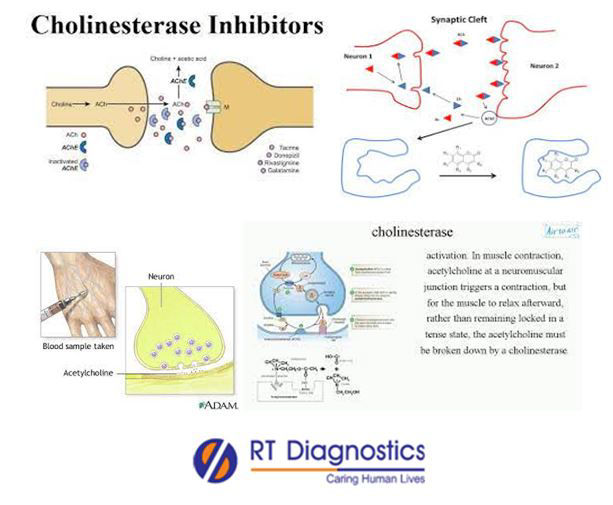Cholinesterase:
Why Cholinesterase Test?
CLINICAL INFORMATION
Cholinesterase is an enzyme that occurs chiefly at neuromuscular junctions, which promotes the hydrolysis of acetylcholine at postsynaptic receptors. The function of this enzyme (catalyzing the hydrolysis) is to cleave choline-based esters i.e mainly cholinesterase (cholinergic neurotransmitters) into choline and acetic acid. Serum Cholinesterase test is performed to determine the levels of Acetyl-Cholinesterase (AC is found in nerve tissue, lung, spleen, the gray matter of the brain, and RBCs) and pseudo-cholinesterase – PCHE or also called as butyrylcholinesterase – BuChE (it is primarily found in the liver, pancreas, heart, etc) activity in the blood. Cholinesterase test helps to screen, detect, diagnose and monitor during treatment during prognosis in organophosphate pesticide exposure and/or poisoning, pet treatment for flea and ticks. In general organophosphates eg. Diazinon and malathion (present in pesticides, herbicides, veterinary medications, etc) and/or carbamate insecticide inhibit the activity of cholinesterase activity in both plasma and tissues, hence patients present with clinical manifestations of difficulty in breathing, muscle weakness, cyanosis, flaccid paralysis, and coma. This test usually helps to monitor treatment (prognosis) for those who may be at increased risk of exposure to organophosphate compounds mainly in agriculture and chemical industries. Symptoms of toxicity include headaches, nausea, increased tearing in the eyes, excessive sweating, excessive salivation, dizziness, diarrhea, muscle spasm, confusion, etc. when toxicity progresses it can lead to vomiting, vision difficulties, lack of muscular coordination, slowed breathing, low respiratory rate, seizure, coma, and death. Moreover, the plasma enzyme activity of cholinesterase has a vital role in the metabolism of suxamethonium (muscle relaxant used in surgery) leading to suxamethonium-apnoea (anesthetic related drug Mivacurium, and so PCHE is useful to evaluate patients after exposure to succinylcholine muscle relaxant). Decreased cholinesterase activity is found in pregnancy and liver diseases.

General Instructions:
Sample Requirement: Specimen - Blood sample collected from the vein. Test Preparation: None.
NOTE - Sample for specimen collections may vary based on the patient’s condition/cases according to the patient’s presenting complaints/signs or symptoms:
SPECIMEN REQUIREMENT (Special or Rare Cases) - As instructed and guided by Physician / Clinician / Pathologist / as per Laboratory’s requirements, according to procedures and protocols.
Sample Requirement: Blood Sample taken from the vein
Test Preparation: None
This Multi-Specialty Clinical Referral Laboratory RT DIAGNOSTICS provides precise and accurate tests with an extensive range of testing services to the medical centers to help in the diagnosis and identification of pathology in the test specimens for infectious diseases and also to evaluate the function of organ systems of the patient. It prevents further complications and helps to stabilize and restore health to near normalcy at the earliest without delay.



